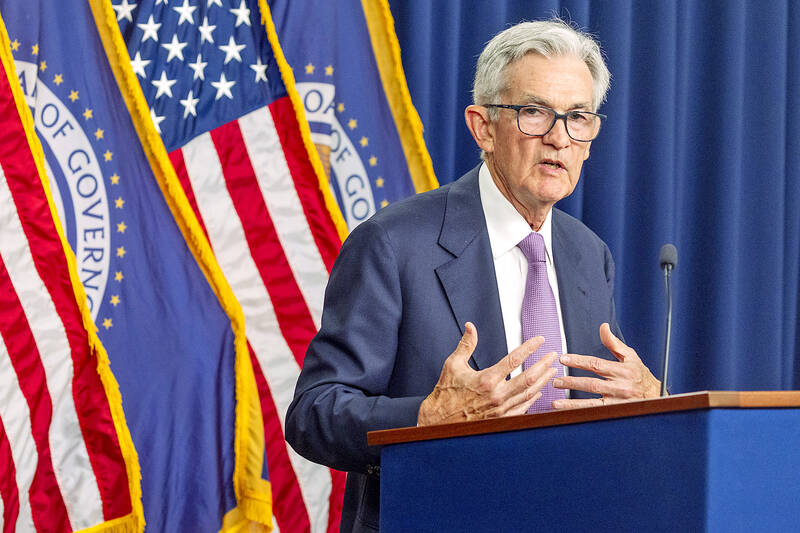One of the most consequential US Federal Reserve meetings in recent history has put investors’ focus squarely on one question: Whether the central bank has kicked off its rate-cutting cycle in time to keep the economy from slowing too rapidly.
The Fed delivered a 50 basis point rate cut on Wednesday — lowering borrowing costs for the first time in more than four years — and assured investors the larger-than-usual-sized reduction was a measure to safeguard a resilient economy, rather than an emergency response to recent weakness in the labor market.
Bets on the size of the rate cut swung in the days before the meeting and were near an even split on Wednesday morning.

Photo: EPA-EFE
The degree to which Fed Chairman Jerome Powell’s outlook pans out is likely to be a key factor in the trajectory of stocks and bonds for the remainder of this year.
Prospects of a “soft landing,” where the Fed brings down inflation without pushing the economy into recession, have lifted stocks and bonds this year. However, signs of a softening labor market have fueled worries that the Fed might be too late in acting to shore up growth.
“Right now, it looks as if the market is going to pause to digest what was to many a surprise,” said Eric Beyrich, co-chief investment officer (CIO) of investment advisory firm Sound Income Strategies.
“There will still be people thinking, ‘wow, If the Fed cuts big like that, what do they see that we’re not seeing that suggests the economy will get worse?’” he said.
Market reaction on Wednesday was relatively subdued as stocks, Treasuries and the dollar retraced initial, post-decision rallies.
The S&P 500 ended down 0.3 percent, after rising as much as 1 percent during the session. The index is up nearly 18 percent this year and stands near a record high.
In comments following the decision, Powell called the move a “recalibration” to account for the sharp decline in inflation since last year.
The central bank wanted to stay ahead of any potential weakening in the jobs market, Powell said.
Some investors were skeptical.
“Despite what Chair Powell is saying in the press conference, a 50 basis point move does indicate that there is concern that they are behind the curve,” said Wilshire CIO Josh Emanuel.
Emanuel said he was already overweight bonds coming into the meeting, favoring investment-grade credit over riskier high-yield bonds ahead of an expected deterioration in the economy.
Many others, however, believed the rate cuts were a positive development for the market and would buoy the economy.
“I think that this dramatically increases the odds of the Fed being able to stick the landing, which ultimately will be bullish for risk assets,” said Jeff Schulze, head of economic and market strategy at ClearBridge Investments.
Indeed, stocks have performed well following rate cuts — as long as the economy stayed out of recession.
The S&P 500 has posted an average 14 percent gain in the six months following the first reduction of a rate-cutting cycle during a non-recessionary period, data from Evercore ISI going back to 1970 showed. That compares to a 4 percent decline in the period after an initial cut during a recession.

The US dollar was trading at NT$29.7 at 10am today on the Taipei Foreign Exchange, as the New Taiwan dollar gained NT$1.364 from the previous close last week. The NT dollar continued to rise today, after surging 3.07 percent on Friday. After opening at NT$30.91, the NT dollar gained more than NT$1 in just 15 minutes, briefly passing the NT$30 mark. Before the US Department of the Treasury's semi-annual currency report came out, expectations that the NT dollar would keep rising were already building. The NT dollar on Friday closed at NT$31.064, up by NT$0.953 — a 3.07 percent single-day gain. Today,

‘SHORT TERM’: The local currency would likely remain strong in the near term, driven by anticipated US trade pressure, capital inflows and expectations of a US Fed rate cut The US dollar is expected to fall below NT$30 in the near term, as traders anticipate increased pressure from Washington for Taiwan to allow the New Taiwan dollar to appreciate, Cathay United Bank (國泰世華銀行) chief economist Lin Chi-chao (林啟超) said. Following a sharp drop in the greenback against the NT dollar on Friday, Lin told the Central News Agency that the local currency is likely to remain strong in the short term, driven in part by market psychology surrounding anticipated US policy pressure. On Friday, the US dollar fell NT$0.953, or 3.07 percent, closing at NT$31.064 — its lowest level since Jan.

The New Taiwan dollar and Taiwanese stocks surged on signs that trade tensions between the world’s top two economies might start easing and as US tech earnings boosted the outlook of the nation’s semiconductor exports. The NT dollar strengthened as much as 3.8 percent versus the US dollar to 30.815, the biggest intraday gain since January 2011, closing at NT$31.064. The benchmark TAIEX jumped 2.73 percent to outperform the region’s equity gauges. Outlook for global trade improved after China said it is assessing possible trade talks with the US, providing a boost for the nation’s currency and shares. As the NT dollar

The Financial Supervisory Commission (FSC) yesterday met with some of the nation’s largest insurance companies as a skyrocketing New Taiwan dollar piles pressure on their hundreds of billions of dollars in US bond investments. The commission has asked some life insurance firms, among the biggest Asian holders of US debt, to discuss how the rapidly strengthening NT dollar has impacted their operations, people familiar with the matter said. The meeting took place as the NT dollar jumped as much as 5 percent yesterday, its biggest intraday gain in more than three decades. The local currency surged as exporters rushed to